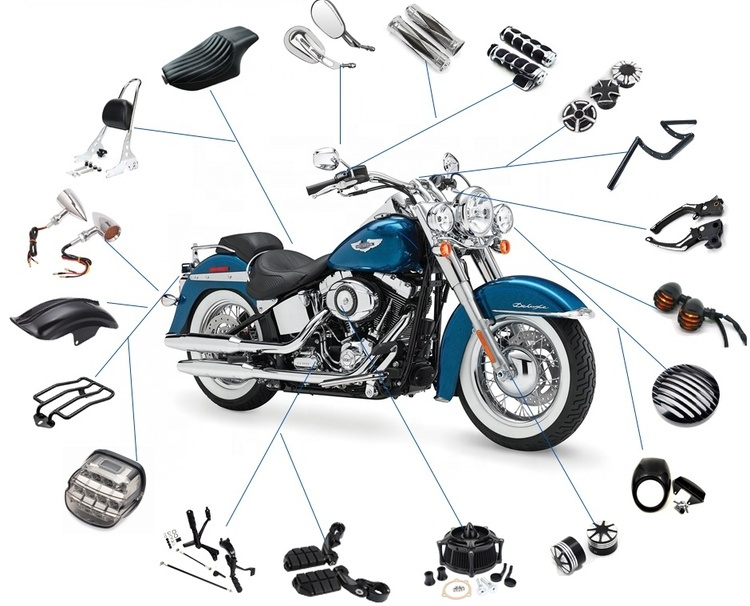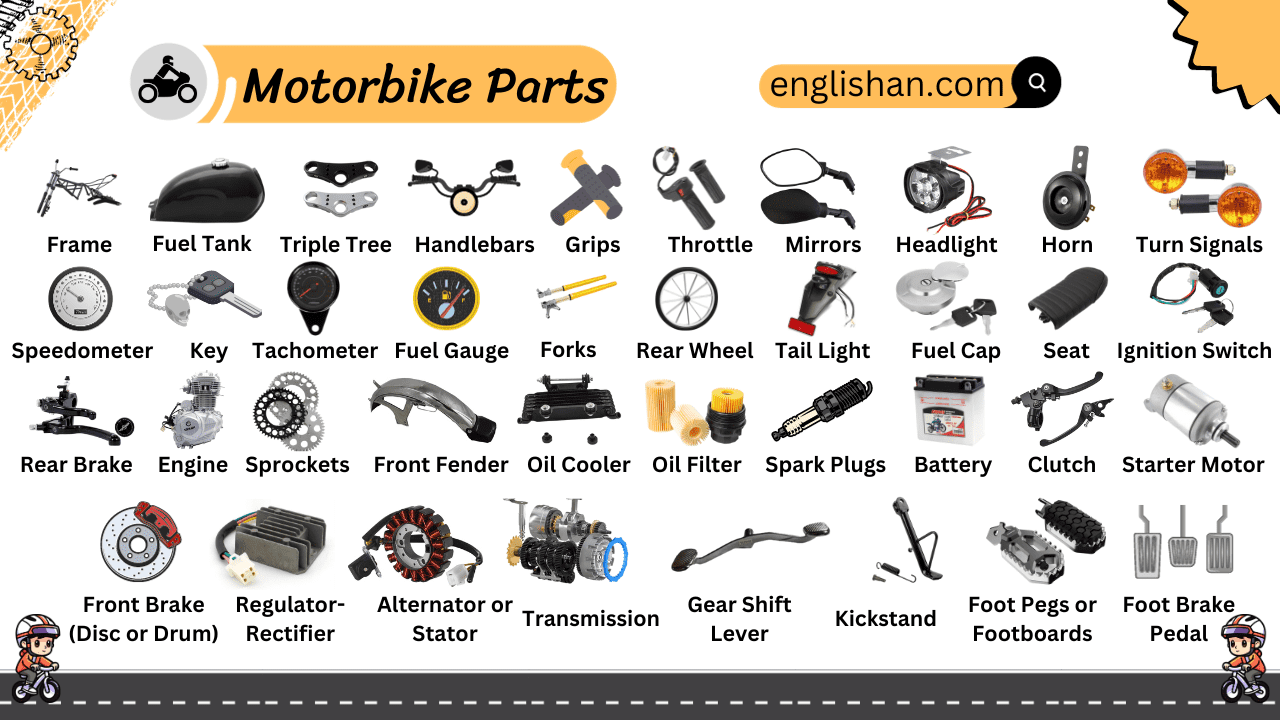Why Riders Trust Only Dealer-Certified OEM Parts New Zealand for Long-Term Value
Why Riders Trust Only Dealer-Certified OEM Parts New Zealand for Long-Term Value
Blog Article
Discover the Crucial Motorcycle Components You Need for Ideal Performance
Recognizing the vital parts of a motorcycle is fundamental for attaining peak efficiency. Each element, from the engine to the braking system, plays an essential role in general functionality and safety and security. Normal maintenance can protect against unexpected failings and boost the riding experience. Nonetheless, several riders neglect the intricacies of these systems. Finding how they collaborate can bring about a more efficient trip. What critical elements should every biker focus on?
The Engine: The Heart of Your Bike
The engine functions as the core component of a motorcycle, driving its performance and defining its capacities. It is in charge of converting fuel right into power, which powers the bike ahead. Various sorts of engines are employed, consisting of single-cylinder, V-twin, and inline setups, each offering unique attributes fit for different riding styles and purposes. The engine size, normally gauged in cubic centimeters (cc), substantially affects efficiency, with larger engines normally giving more power and torque.Furthermore, the engine's style and innovation, such as gas shot systems or air-cooling versus liquid-cooling, impact efficiency and integrity. Maintenance is vital for peak procedure; aspects like regular oil changes and checking ignition system guarantee longevity. Bikers usually think about an engine's responsiveness and level of smoothness, as these qualities boost the general riding experience. Ultimately, the engine stays a crucial element that defines not just the motorcycle's performance but additionally the motorcyclist's link to the maker.
The Transmission: Moving Gears Smoothly
The transmission plays a vital role in a motorcycle's performance, specifically in the mechanics of gear changing. Understanding exactly how to move equipments efficiently can boost the general riding experience, while normal maintenance assurances peak performance. Appropriate focus to these facets can significantly impact the durability and effectiveness of the motorbike.

Gear Shifting Mechanics
Smooth equipment shifting is important for ideal motorbike performance, substantially impacting both acceleration and control. The technicians of equipment moving include the interaction in between the clutch, gear lever, and transmission system. When a biker involves the clutch, it disengages the engine from the transmission, allowing for a gear change without harming the elements. A well-timed launch of the clutch, combined with specific activity of the gear bar, helps with a smooth modification in between equipments. This process guarantees that the engine operates within its best power band, improving efficiency. Motorcycle Spares Christchurch. Furthermore, comprehending the equipment proportions and their effect on speed and torque can help motorcyclists make educated options during changes, eventually adding to a much more responsive and satisfying riding experience
Upkeep Tips Importance
Regular maintenance plays a vital role in assuring that the transmission system operates successfully, permitting smooth equipment shifts. On a regular basis examining and transforming the transmission liquid is essential, as old fluid can cause raised friction and wear. In addition, inspecting the clutch for wear warranties peak interaction and disengagement, avoiding slippage throughout gear modifications. Lubrication of relocating parts is just as essential to reduce rubbing and improve efficiency. Bike owners must additionally monitor for leaks and uncommon sounds, as these can show underlying concerns. By sticking to these upkeep suggestions, cyclists can lengthen the life expectancy of their transmission system, guaranteeing that equipment shifts continue to be smooth and adding to the total efficiency of their motorcycle.
The Braking System: Ensuring Safety And Security on Every Ride
Braking systems are essential components that directly affect a motorbike's safety and efficiency. They include various components, including brake pads, rotors, calipers, and hydraulic lines, all interacting to assure reliable deceleration. The sort of braking system-- normally either disc or drum-- affects responsiveness and quiting power.Regular upkeep is necessary to copyright peak efficiency; used brake pads can result in decreased performance and boosted quiting distances. In addition, the quality of brake liquid must be kept an eye on, as it can soak up wetness in time, endangering stopping efficiency.Riders ought to also think about the significance of anti-lock stopping systems (ABS), which prevent wheel lockup throughout sudden stops, boosting overall safety. Appropriately operating brakes are not almost stopping; they instill confidence in the motorcyclist, permitting safer navigation via various surfaces. Eventually, a dependable braking system is crucial for taking pleasure in every adventure with satisfaction.
The Suspension: Enhancing Comfort and Control
A well-functioning shock absorber significantly adds to a motorbike's general efficiency, complementing the efficiency of the stopping system. The suspension plays a substantial duty in taking in shocks from uneven surface areas, guaranteeing a smoother adventure while preserving tire call with the roadway. This contact is vital for both security and control, allowing cyclists to navigate corners with confidence and precision.Different kinds of suspension systems, such as telescopic forks or mono-shocks, use differing degrees of comfort and handling. Properly tuned suspension boosts responsiveness, giving the biker with an extra connected feeling to the motorbike. Routine maintenance checks are necessary to identify the suspension components, consisting of dampers and springs, are operating at their ideal. An efficient suspension system not only raises the riding experience however additionally adds to the longevity of other motorbike parts by decreasing damage. Consequently, buying quality suspension is vital for any type of serious motorcycle lover.
The Tires: Linking You to the Roadway
Tires play a crucial duty in a motorcycle's efficiency, acting as the main link between the motorcyclist and the road. Recognizing the different sorts of tires offered can greatly affect handling and safety and security. Additionally, routine upkeep is crucial to assure peak tire performance and longevity.
Tire Types Explained
Exactly how do different tire types affect a motorbike's efficiency? Tire types play a vital function in determining a motorcycle's hold, handling, and stability. Sport tires, created for high performance, deal boosted traction and responsiveness on smooth roads, making them ideal for competing and aggressive riding. On the other hand, exploring tires prioritize toughness and convenience, offering a smoother adventure for long-distance travel. Off-road tires, characterized by their rugged walk patterns, master traction on unpaved surface areas, appropriate for journey lovers. In addition, dual-sport tires mix qualities from both on-road and off-road classifications, accommodating functional riding requirements. Inevitably, selecting the ideal tire type is necessary for enhancing performance, ensuring safety, and enhancing the total riding experience.
Upkeep Tips Offered
While riding on the roadway, maintaining suitable tire condition is crucial for safety and performance. Routinely examining tire pressure is necessary, as under-inflated tires can lead to poor handling and boosted wear. It is a good idea to inspect walk deepness often; worn tires concession grasp and security. On top of that, riders ought to seek indications of damage, such as bulges or cracks, which can show the demand for substitute. Turning tires regularly ensures even put on, enhancing durability. Maintaining tires tidy from particles and preventing visit this site extreme visuals can prolong their life-span. Maintaining appropriate positioning and balance contributes to peak efficiency, decreasing anxiety on various other bike components. Complying with these maintenance tips will considerably boost the total riding experience.
The Fuel System: Fueling Performance and Performance
The fuel system plays an important duty in taking full advantage of a motorcycle's performance and performance, as it assures the optimal shipment of gas to the engine. It comprises several important components, consisting of the gas container, gas pump, fuel filter, and gas injectors or carburetor. Each part should work successfully to assure a smooth and powerful ride.The gas storage tank shops gasoline and supplies it to the engine using the gas pump, which creates the necessary pressure. A fuel filter prevents contaminants from going into the engine, while the injectors or carburetor mix gas with air for combustion.Proper maintenance of the gas system is essential; a blocked filter or malfunctioning injector can lead to reduced performance and boosted gas consumption. By validating that the gas system operates effectively, cyclists can appreciate enhanced throttle reaction, far better gas economic climate, and in general boosted riding experience.
The Electrical System: Powering Your Adventure
An effective electrical system is crucial for the total functionality and safety and security of a motorbike, as it powers crucial components such as the ignition, illumination, and various electronic systems. This system includes the battery, which stores energy, and the alternator, responsible for creating power while the engine runs. The circuitry harness connects these parts, making certain reputable power distribution.Additionally, merges shield the system from overloads, while relays assist regulate high-current devices with low-power signals. A properly maintained electric system improves efficiency by making certain smooth beginnings and constant operation of signals and lights, crucial for cyclist exposure and safety.Regular checks of the battery's fee and connections are very important for stopping electrical failings. Cyclists ought to likewise examine circuitry for wear and tear, guaranteeing all parts work preferably. Eventually, a durable electrical system adds significantly to the total performance and integrity of the motorcycle.
Regularly Asked Inquiries
Exactly how Often Should I Replace My Bike's Battery?
The frequency of motorcycle battery substitute depends on use and maintenance (Motorcycle Parts Auckland). Usually, batteries need to be replaced every 3 to 5 years. Normal checks can assist identify when a substitute is required for peak efficiency
What Tools Do I Required for Basic Motorbike Upkeep?
For fundamental motorbike maintenance, one calls for necessary devices such as an outlet collection, wrenches, screwdrivers, pliers, tire stress scale, and check this a torque wrench. These devices facilitate reliable upkeep and assure the motorcycle runs successfully and safely.
Exactly How Can I Enhance My Bike's The rules of aerodynamics?
To enhance bike the rules of aerodynamics, one should take into consideration readjusting fairings, utilizing windshield expansions, optimizing body setting, and decreasing general weight. These alterations aid lessen drag, improving stability and gas performance throughout adventures.
What Are the Indications of a Failing Electric System?
Signs of a falling short electric system include dimming lights, problem beginning, irregular tool analyses, and blown integrates. Motorcycle Parts Auckland. Uncommon scents or deterioration around battery terminals might also indicate underlying issues needing immediate attention for safety and security and efficiency

How Do I Select the Right Oil for My Motorcycle?
When picking oil for a motorbike, one should take into consideration the supplier's requirements, viscosity ratings, and the sort of riding. Furthermore, synthetic versus conventional oil can affect performance and engine defense, influencing the decision substantially. The engine size, typically gauged in cubic centimeters (cc), considerably influences efficiency, with larger engines normally giving even more power and torque.Furthermore, the engine's design and innovation, such as fuel injection systems or air-cooling versus liquid-cooling, impact effectiveness and dependability. A well-functioning suspension system significantly contributes to a motorbike's overall efficiency, complementing the efficiency of the braking system. The fuel system plays an essential duty in maximizing a motorcycle's efficiency and effectiveness, as it ensures the optimum delivery of fuel to the engine. A fuel filter stops pollutants from entering the engine, while the injectors or carburetor mix fuel with air for combustion.Proper upkeep of the fuel system is critical; a stopped up filter or malfunctioning injector can lead to decreased performance and increased gas consumption. A properly maintained electric system improves efficiency by ensuring smooth starts and website link consistent operation of signals and lights, important for cyclist presence and safety.Regular checks of the battery's cost and connections are crucial for avoiding electric failings.
Report this page